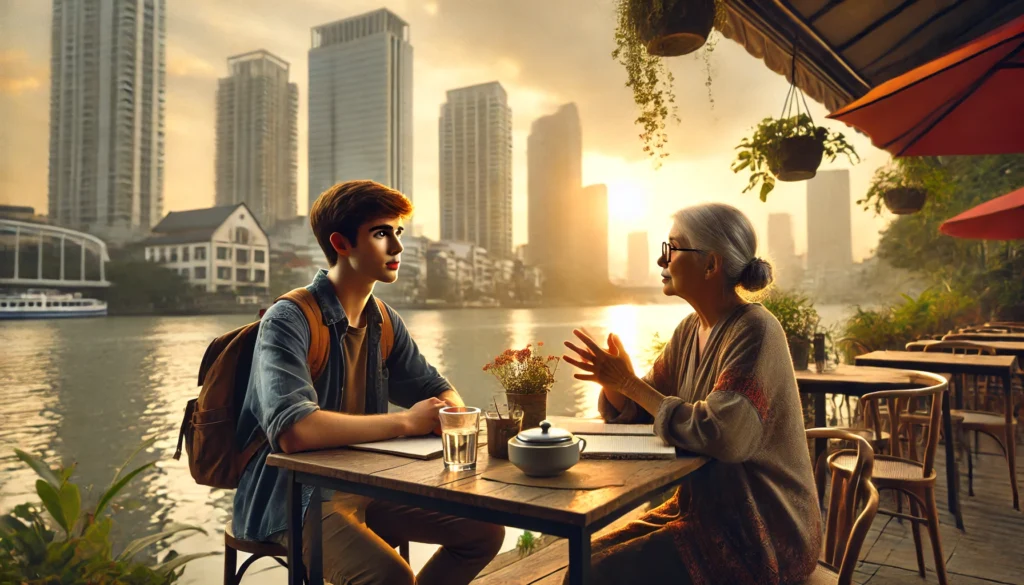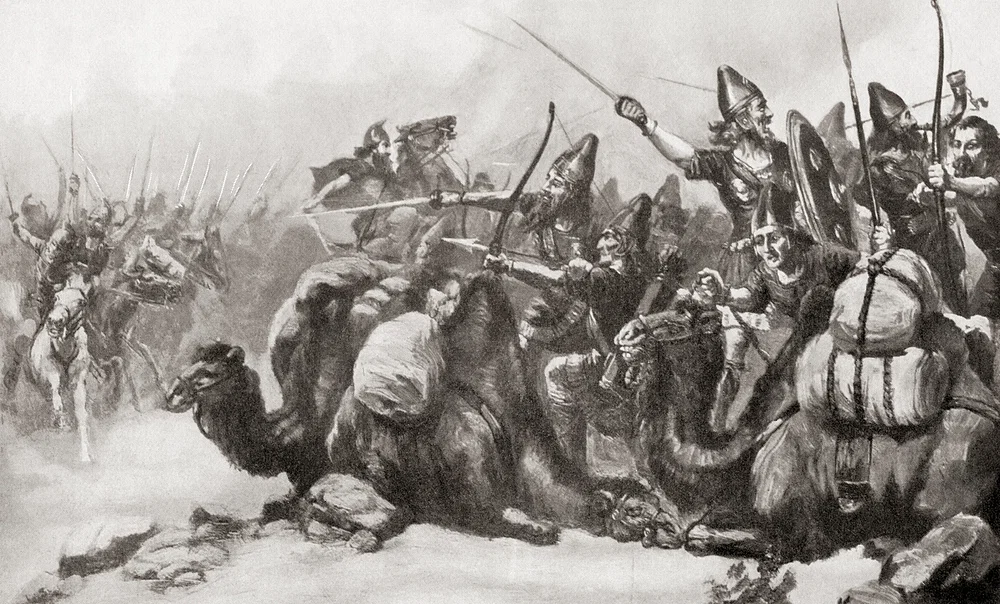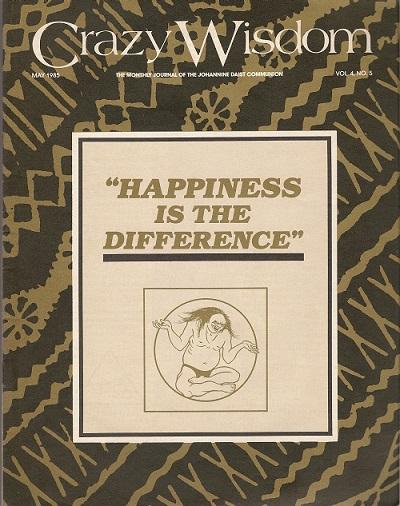A Story for Our Times
“Threads of Light: A Conversation for an Uncertain Future”
Beezone, Ed Reither, and ChatGPT*
*Adapted from Crazy Wisdom – The Monthly Journal of the Johannine Daist Communion (Adidam) Vol. 4 No. 5. – May 1985 “Happiness is the Difference”.
***
In a world grappling with technological upheaval, environmental challenges, and social transformations sets the stage for an intimate and timeless dialogue between a struggling student and his wise mentor. Against the backdrop of a bustling city, Alex, a young man searching for clarity in a sea of uncertainties, seeks the counsel of Professor Reeve, whose calm wisdom has become a beacon for many. Their conversation, spanning riverside cafes and rooftop gardens, weaves together questions of existence, resilience, and meaning in a world on the brink of profound change. This is a story of seeking, of finding stillness amidst chaos, and of discovering truths that transcend time.

 n the year 2024, amidst the turmoil of an ever-changing world, a struggling college student named Alex found himself sitting in the minimalist office of his mentor, Professor Reeve. Alex had been wrestling with existential questions, a sense of impending doom about the state of the world, and his own doubts about the path he was walking. The professor, a polymath known for his unshakable calm and deep wisdom, had long been a source of guidance for his students. That morning, Alex had finally mustered the courage to pour out his fears.
n the year 2024, amidst the turmoil of an ever-changing world, a struggling college student named Alex found himself sitting in the minimalist office of his mentor, Professor Reeve. Alex had been wrestling with existential questions, a sense of impending doom about the state of the world, and his own doubts about the path he was walking. The professor, a polymath known for his unshakable calm and deep wisdom, had long been a source of guidance for his students. That morning, Alex had finally mustered the courage to pour out his fears.
After hours of discussion, Professor Reeve, sensing that Alex needed a change of scenery, suggested they take a walk to the nearby waterfront café. The city’s skyline framed the river, its reflection rippling like the uncertainties of the times. Alex was hesitant, but Reeve’s reassuring demeanor nudged him to agree.
At the café, they found a quiet spot near the water. The conversation meandered from artificial intelligence to ancient philosophy, from climate change to the ethics of modern technology. Alex, always curious, asked, “Professor, have you ever heard of the simulation theory?”
Reeve chuckled softly, his eyes crinkling at the corners. “I’ve encountered it, Alex. But tell me—do you think it changes the way we should live our lives?”
Hours melted away as they discussed the intricacies of perception, reality, and what it meant to live authentically in an age of distraction and disinformation. The sun dipped lower, and as the golden hour bathed the city in warmth, Alex hesitated but asked, “Professor, may I invite you to dinner? There’s still so much I want to ask.”
Reeve agreed, and they made their way to a rooftop garden restaurant nearby. The air was crisp, filled with the aroma of herbs and flowers. As they sat at their table, surrounded by vines and twinkling lights, Alex’s questions turned more personal.
“Professor,” Alex began, his voice trembling slightly, “what if the systems we rely on collapse? What if artificial intelligence overtakes us, or climate change renders cities uninhabitable? What if everything we build—our ideas, our communities, even the wisdom you’ve shared with me—gets lost in the chaos? How do we find meaning in a world that might fall apart?”
The weight of Alex’s “what ifs” hung in the air. Reeve leaned forward, his face illuminated by the soft glow of the table lantern.

“Alex,” he began, his voice steady, “history has always been a story of rising and falling. Civilizations have come and gone, yet the essence of truth remains. The technologies we create, the societies we build—they are not the source of meaning. Meaning is found in how we live, how we connect, how we love.
“If the systems collapse, the truth within you—the awareness of being alive—will remain. You see, the wisdom we seek is not in books or servers or institutions. It’s in the very fabric of existence itself. If we live with integrity, if we nurture our inner light, no force—neither technology nor disaster—can extinguish that.
“What we value most can never be destroyed, Alex. Not by AI, not by climate change, not by the collapse of governments. The question isn’t what will happen, but how you will stand in the face of it. Will you let fear dictate your life, or will you choose to embody the truth you know in your heart?”
The rooftop grew quiet. Around them, the hum of the city faded into the background as Alex absorbed his mentor’s words. For the first time in a long while, he felt a strange calm. The questions that had haunted him seemed to dissolve into something larger, something he couldn’t yet articulate but felt deeply.
“Thank you, Professor,” Alex said at last, his voice full of gratitude. “I think I understand now.”
Reeve smiled, a warm, knowing expression. “Good. And remember, Alex: no matter what the future brings, you carry the essence of that understanding within you. Let that be your guide.”
As they left the restaurant and stepped into the neon-lit night, Alex felt a renewed sense of purpose. The city around him was as chaotic as ever, but within, he carried a stillness—a light he could not deny.
